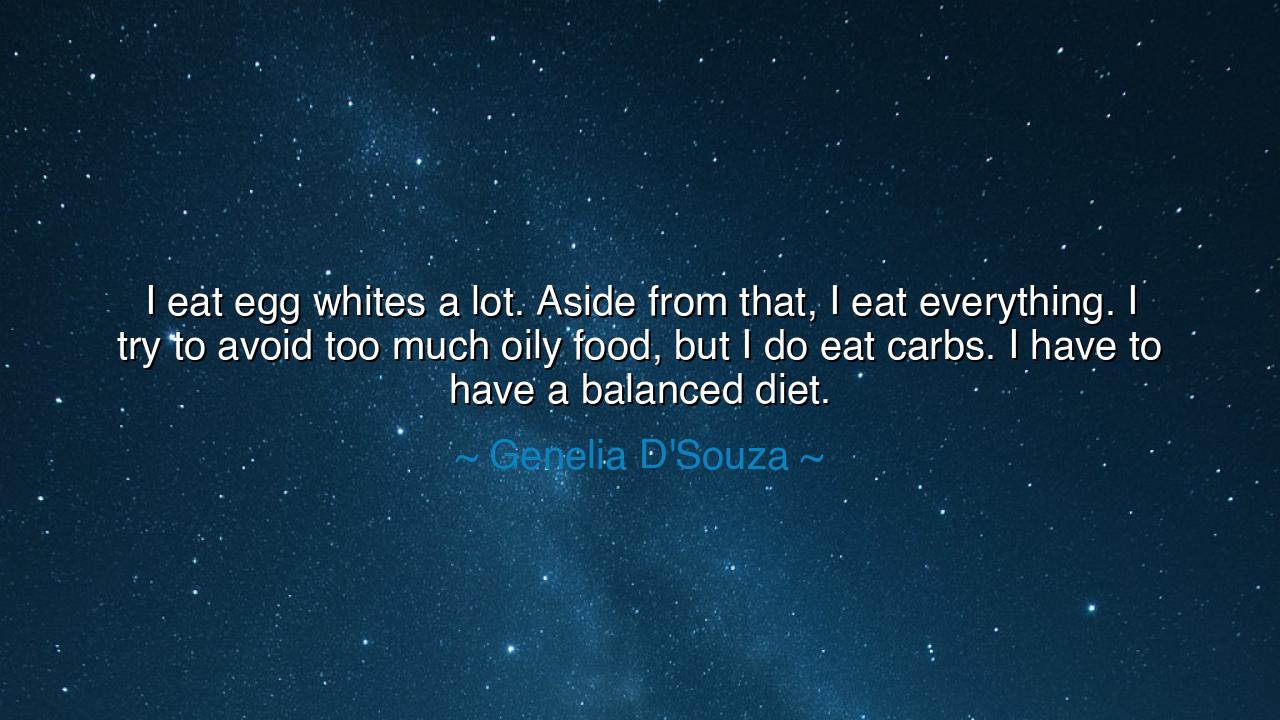
I eat egg whites a lot. Aside from that, I eat everything. I try
I eat egg whites a lot. Aside from that, I eat everything. I try to avoid too much oily food, but I do eat carbs. I have to have a balanced diet.






In the eternal dance of life, the most profound wisdom often resides in the simplicity of our daily choices. Genelia D’Souza offers a reflection that speaks to the heart of balance and moderation: "I eat egg whites a lot. Aside from that, I eat everything. I try to avoid too much oily food, but I do eat carbs. I have to have a balanced diet." In these words, she reveals a timeless truth: true health and well-being are not found in extremes, but in finding harmony between indulgence and discipline, between the pleasures of life and the needs of the body. Her approach is one that recognizes the interconnectedness of the body’s needs and the importance of nourishing it in a way that sustains both vitality and joy.
The ancient Greeks were the first to champion the idea of balance in all things, especially in the nourishment of the body. Hippocrates, often referred to as the father of medicine, taught, "Let food be thy medicine, and medicine be thy food." To Hippocrates, the true path to health was not one of strict deprivation, but of thoughtful, balanced choices that respected the needs of the body. Just as D’Souza speaks of moderating the intake of oily foods while embracing the necessary carbs, the Greeks understood that health was about providing the body with what it needs to thrive, without going to extremes. True well-being is nurtured through mindful nourishment, not the elimination of entire food groups or the overindulgence in any one thing.
In Rome, Cicero, the great philosopher, often wrote about the importance of moderation. He understood that excess in any form—whether in food, drink, or desire—leads to imbalance and harm. Cicero’s teachings reflect a life where the body is nourished not by extremes, but by a steady, thoughtful approach to diet and exercise. Similarly, D’Souza follows this ancient wisdom, recognizing that a balanced diet is key to maintaining vitality. She does not shun foods like carbs, but instead seeks to consume them in moderation, a practice that allows her to enjoy life’s pleasures without sacrificing her health or well-being. In this, we see how both the Romans and D’Souza understand that health arises not from rigid restriction, but from a life of balance and thoughtful choices.
Consider the ancient Spartans, renowned for their strength and discipline. Their diet was simple but powerful, designed to fuel their intense physical training without overindulgence. They knew that to be strong in battle, one must avoid excessive foods that would weigh down the body, yet they did not deny themselves the nourishment they needed. The Spartans, like D’Souza, embraced the concept of balance—focusing on foods that sustained their strength while avoiding excess. Their physical prowess was not simply the result of intense exercise but of a diet that was aligned with their goals. The Spartans embodied the understanding that to achieve true strength, one must tend to the body with care, focusing on what nurtures it without succumbing to the allure of indulgence.
The Buddhist tradition, too, speaks of balance in the way we nourish ourselves. The Buddha taught that true enlightenment lies in the middle way, a path that avoids both the extremes of self-indulgence and self-denial. In the Buddhist teachings, there is an emphasis on mindful eating, understanding the true needs of the body without overindulgence. D’Souza’s approach to diet mirrors this principle—she does not see food as something to be feared or overly controlled but as a tool to support her body’s natural rhythms. By choosing a balanced diet, she follows the path of mindful nourishment, honoring the body’s needs while avoiding the extremes of restriction or excess. This is a path that recognizes the body as a sacred vessel to be cared for, not as something to be controlled or punished.
The story of Alexander the Great also offers a powerful reflection on balance. Alexander, one of the greatest military minds in history, was not just a conqueror of lands, but a leader who understood the importance of maintaining his physical health. His soldiers trained their bodies not through extreme fasting or overindulgence but through disciplined routines and mindful nourishment. Alexander’s strength came not from excess, but from the care he took in nourishing himself and his men with the right foods—foods that supported endurance without burdening the body. In much the same way, D’Souza reflects this principle in her diet: the foods she consumes sustain her vitality and strength, providing her with the energy needed to meet the demands of life without overwhelming her system with excess.
The lesson that D’Souza offers is simple yet profound: balance is the key to a life of lasting health. Just as the ancients knew, a balanced diet—one that includes all food groups in moderation—is essential for maintaining vitality. D’Souza teaches us that we do not need to restrict ourselves, but rather we must be mindful of our choices, embracing the foods that nourish us and avoiding excess. True strength and well-being are not found in rigid rules or indulgence, but in the freedom to choose what serves us best, allowing us to live with vitality, joy, and purpose.
In your own life, seek to embrace the wisdom of balance. Choose foods that nourish you and support your body’s needs, but avoid extremes. Recognize that true health is found in moderation—not in overindulgence, but in mindful nourishment. Like D’Souza, find freedom in making choices that empower your body, mind, and spirit. By living in balance, you will not only sustain your health, but you will create a life that is full of vitality, joy, and purpose.






AAdministratorAdministrator
Welcome, honored guests. Please leave a comment, we will respond soon